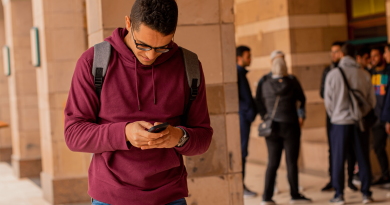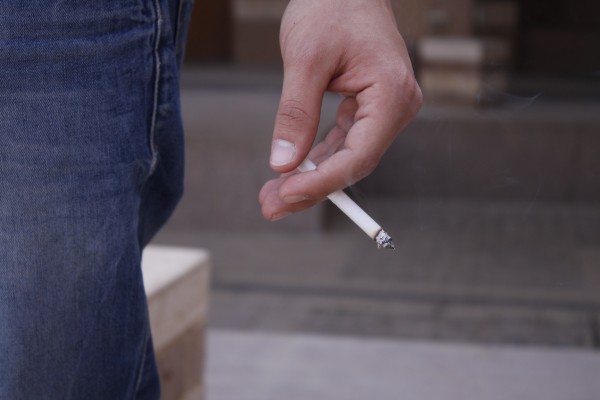Happiness Redefined: Exploring Well-Being, Growth, and Resilience
- Reporters: Jana Al-Awady and Youssef El-Ebeidy
- Photographer: Omar Abouzeid
Happiness often feels like an elusive concept, slipping through our fingers just when we believe we’ve grasped it. This multifaceted emotion is influenced by relationships, personal values, experiences, expectations, and overall well-being.
Recent initiatives under the Dean of Students’ Life Mentorship Program (LMP) have explored these themes, bringing students, staff, and alumni together in a series of events to find out what truly fosters joy and fulfillment.
During Mental Health week in late October, May Ramy, Senior Director of Co-Curricular Programs and Human Development, eased participants into a journey of self-discovery during the Path to Happiness event at the Alumni Lounge.
The event kicked off with an unconventional icebreaker, dancing with eyes closed. Initially met with hesitation, the exercise gradually allowed participants to let go of their inhibitions, setting the stage for a transformative session that balanced both playful energy and introspective depth.
As the atmosphere shifted, Ramy posed the critical question: “Who can define happiness?” This question opened the door to exploring the spiritual, physical, intellectual, and relational dimensions of happiness, revealing just how complex and deeply personal this emotion can be.
A significant takeaway from the session was the emphasis on relational well-being. Ramy highlighted that deep, quality relationships are among the strongest indicators of happiness. “We build empathy through painful emotions,” she remarked, resonating deeply with attendees who shared vulnerabilities and personal stories.
Throughout the event, the theme of mindfulness emerged as a central component of happiness.
“The past and future are beyond our control,” Ramy reminded participants.
“The only moment we truly have is the present.”
This simple yet profound message resonated with many, reinforcing the idea that being fully present in our experiences—both joyful and painful— can lead to a deeper understanding of happiness.
Roqaya Sakr, a psychology student and one of the event coordinators, said that this year’s LMP events were designed to target the mental well-being of the entire AUC community, including alumni and staff.
“This event is different,” Sakr explained. “It focuses on mindfulness and aims to spread awareness about how to live a happy and fulfilling life.”
This inclusive approach, she noted, marked a departure from past LMP events that primarily focused on students.
Yasmine Ziad, an AUC alumna and psychotherapist, says that happiness often lies in our ability to connect with ourselves and others.
“It’s about recognizing that our emotions are valid and essential to our journey,” Ziad explained.
She emphasized that true happiness is not a constant state but rather about embracing the full spectrum of emotions—joy, sadness, and everything in between. Each emotion, Ziad noted, teaches us something valuable.
The initiatives didn’t stop with the Path to Happiness. Concluding Mental Health Week was another workshop titled “The Path of Well-Being,” also led by Ramy. This session dove into the intricate relationship between failure and success, emphasizing how intellectual well-being can be enhanced through self-understanding, passion, and skill development.
Failure was framed as an essential component of success, with an emphasis on balancing expectations and recognizing that pain can lead to personal growth. Ramy added that “one of the biggest mistakes is fearing to make them.”
“What would you attempt if you knew you could not fail?” Ramy asked her participants.
This question fostered a mindset that embraced risk and exploration, inspiring participants to redefine their relationship with failure and view it as a stepping stone to growth.
This workshop explored various dimensions of well-being, from relational and physical to mental aspects. Relational well-being was underscored as crucial, highlighting the importance of nurturing relationships with family and friends. Physical well-being was discussed in the context of nutrition, exercise, and meditation, while mental well-being was tied to optimism and persistence in building resilience.
The concept of success was also redefined. Participants were encouraged to view success as part of the journey rather than a final destination, avoiding the reliance on external validation.
The introduction of the “peak potential zone” encouraged participants to identify their passions and strengths, and reflect on how core values shape their unique journeys.
“I’ve always been interested in understanding what really makes people happy,” Waheed El Ghannam, a senior in Management of Information and Communication Technology, told The Caravan.
“This event sounded like a great opportunity to dive into that.”
He described feeling nervous during the dancing exercise but ultimately found it liberating.
“It wasn’t about how I looked; it was about how I felt,” he said, highlighting the power of being present in the moment.
Shahd Hossam, an Integrated Marketing Communication senior, echoed these sentiments.
“The dancing was unexpected, but it was symbolic. It got us out of our heads and into the present moment,” she noted, underscoring the importance of mindfulness in the pursuit of happiness.
Ismail El Kady, an Engineering senior, shared his reason for attending the well-being event: “I was overwhelmed with the pressure of failure and didn’t know how to cope with it.
This workshop really opened my eyes. It helped me realize that failure isn’t the end—it’s just part of the journey.”
In an email sent to the community on November 7, President Ahmed Dallal said that the university is committed to maintaining mental health initiatives at the forefront of AUC’s responsibilities through university policies and services.
To ensure progress continues, Dallal linked a webpage as a “one- stop-shop” for year-round resources and information regarding well-being, providing easy access for all students, faculty, staff, and alumni.




